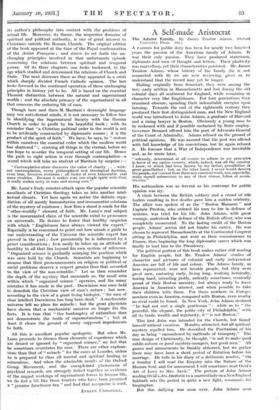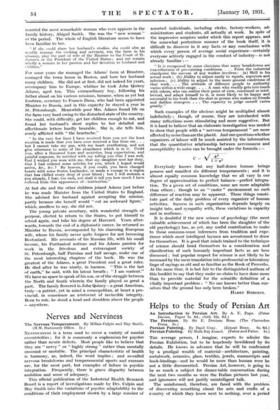A Self-made Aristocrat
A PASSION for public duty has been for nearly two hundred years the passion of the American family of Adams. It was their only passion. They have produced statesmen, diplomats and men of thought and letters. Their plasticity was marvellous, yet their characteristics persisted. Mr. James Truslow Adams, whose history of the family (he is not connected with it) we are now reviewing, gives us to understand that the record may yet be longer.
Hailing originally from Somerset, they were among the very early settlers in Massachusetts and lost during the old colonial days all sentiment for England, while remaining in character very like Englishmen. For four generations they remained obscure, spending their indomitable energies upon farming. Towards the end of the eighteenth century they produced their first distinguished man, and the New England world was introduced to John Adams, a graduate of Harvard and a rising lawyer in Boston. Obviously a young man to be reckoned with and if possible enchained by State employ.
Governor Bernard offered him the post of Advocate-General of the Court of Admiralty. Adams refused on the ground of political opinions. He was assured that the post was offered with full knowledge of his convictions, but he again refused it. He foresaw that a War of Independence was inevitable and, as he wrote later,
" solemnly, determined at all events to adhere to my principles in favor of my native country, which, indeed, was all the country I knew, or which had been known by my father, grandfather or great grandfather ; but, on the other hand, I never would deceive the people, nor conceal from them any essential truth, nor, especially, make myself subservient to any of their crimes, follies or occen- tricities.
His nationalism was as fervent as his contempt for public opinion was icy.
A clash between the British soldiery and a crowd of idle loafers resulting in five deaths gave him a sudden celebrity. The affair was spoken of as the " Boston Massacre " and Captain Preston, who ordered his men to fire in defence of sentries, was tried for his life. John Adams, with great courage, undertook the defence of the British officer, who was completely exonerated. To the lasting credit of the Boston people, Adams' action did not hinder his career. He was chosen to represent Massachusetts at the Continental Congress sitting in. Philadelphia, and went as their commissioner to France, thus beginning the long diplomatic career which was finally to lead him to the Presidency.
The political portion of this book makes rather stiff reading for English people, but Mr. Truslow Adams' studies of character and pictures of colonial and early independent America are full of life and colour. The. Adams family, as here represented, were not lovable people, but they were great men, maturing early, living long, working heroically, hating hard, intending justly, ardently sometimes, comically proud of their Boston ancestry, but always ready to leave America in America's interest, and when possible to take their children with them. For them nowhere in Europe, nowhere even in America, compared with Boston, even nearby no rival could be found. In New York, John Adams declared " he had not met a single gentleman " ; while as to " the
peaceful, the elegant, the polite city of Philadelphia," with all its trade, wealth and regularity, it " is not Boston."
This first John was intended for the Church, but found' himself without vocation. Morality attracted, but all spiritual mystery repelled him. He described the Puritanism of his day as being " encumbered by cartloads of trumpery." The true design of Christianity, he thought, "is not to make good riddle-solvers or good mystery-mongers, but good men." All games and amusements he frankly abhorred, but we gather there may have been a short period of flirtation before his marriage. He tells in his diary of a deliberate resolve, " On a Sunday I will read the Enquiry into the Nature of the Human Soul, and for amusement I will sometimes read Ovid's Art of Love to Mrs. Savil." The picture of John Adams
reading Ovid's Ars Amaforia to a married lady on a New England Sabbath sets the period in quite a new light, comments his
biographer.
But this dallying was soon over. John Adams soon married the most remarkable woman who ever appears in the family history, Abigail Smith. She was the " new woman " of the period. The whole of English literature seems to have been familiar to her.
" If she could share her husband's studies, she could also as readily manage the cooking and servants, run the farm in his absence, play the part of wife of the Minister to the Court of St. James's or the President of the United States; and yet remain wholly a woman in her passion and her devotion to husband and
hildren."
For some years she managed the Adams' farm at Brantree, managed the town house in Boston, and bore her husband many children. She did not at first, did not indeed for years, accompany him to Europe, whither he took John Quincy Adams, aged ten. This extraordinary boy, following his father about on his various missions, became, when as yet but
fourteen, secretary to Francis Dana, who had been appointed Minister to Russia, and in this capacity he stayed a year in St. Petersburgh. Meanwhile poor Mrs. Adams found life on the farm very hard owing to the disturbed state of the country. She could, with difficulty, get her children enough to eat, and found her husband's short replies to her detailed and affectionate letters hardly bearable. She is, she tells him, sorely afflicted with " the heartache."
" In the very few lines I have received from you not the least mention is made that you have ever received aline from me . . but I cannot take my pen, with my heart overflowing, and not give utterance to some of the abundance which is in it. Could you, after a thousand fears and anxieties, long expectation, and painful suspense, be satisfied with my telling you that I was well, that I wished you were with me, that my daughter sent her duty, that I had ordered some articles for you, which I hoped would arrive, &c., &c. ? By heaven, if you could, you have changed heart; with some frozen Laplander, or made a voyage to a region that has chilled every drop of your blood ; but I will restrain a pen already, I fear, too rash, nor shall it tell you how much I have suffered from this appearance of—inattention."
At last she and the other children joined Adams just before he was made Minister from the United States to England. She advised her husband against accepting the mission, partly because she herself would " cut an awkward figure," which, needless to say, she did not.
The young private secretary, with wonderful strength of purpose, elected to return to the States, to put himself to school again, and take his degree at Harvard. Years after- wards, towards the end of a diplomatic career, he returned as Minister to Russia, accompanied by his charming European wife, whom his family never quite forgave for not becoming Bostonized. His accounts of his Russian life, with his small income, his Puritanical notions and his Adams passion for work in the frivolous and extravagant society of St. Petersburgh, half Parisian and half savage, make one of the most interesting chapters of the book. He was the greatest of the Adams, a great President and a great ruler.
He died after he was ninety, in harness. " This is the last of earth," he said, with his latent breath ; •" I am content." We have no space to speak of his son, or of the struggle between the North and South wherein the family played so great a part. The family flowered in John Quincy—a great American,
truly—a patriot, yet in mind a cosmopolitan, at heart a pro- vincial, in conscience an aristocrat of invincible integrity.
Born to rule, he stood a head and shoulders above the people anywhere.



































 Previous page
Previous page